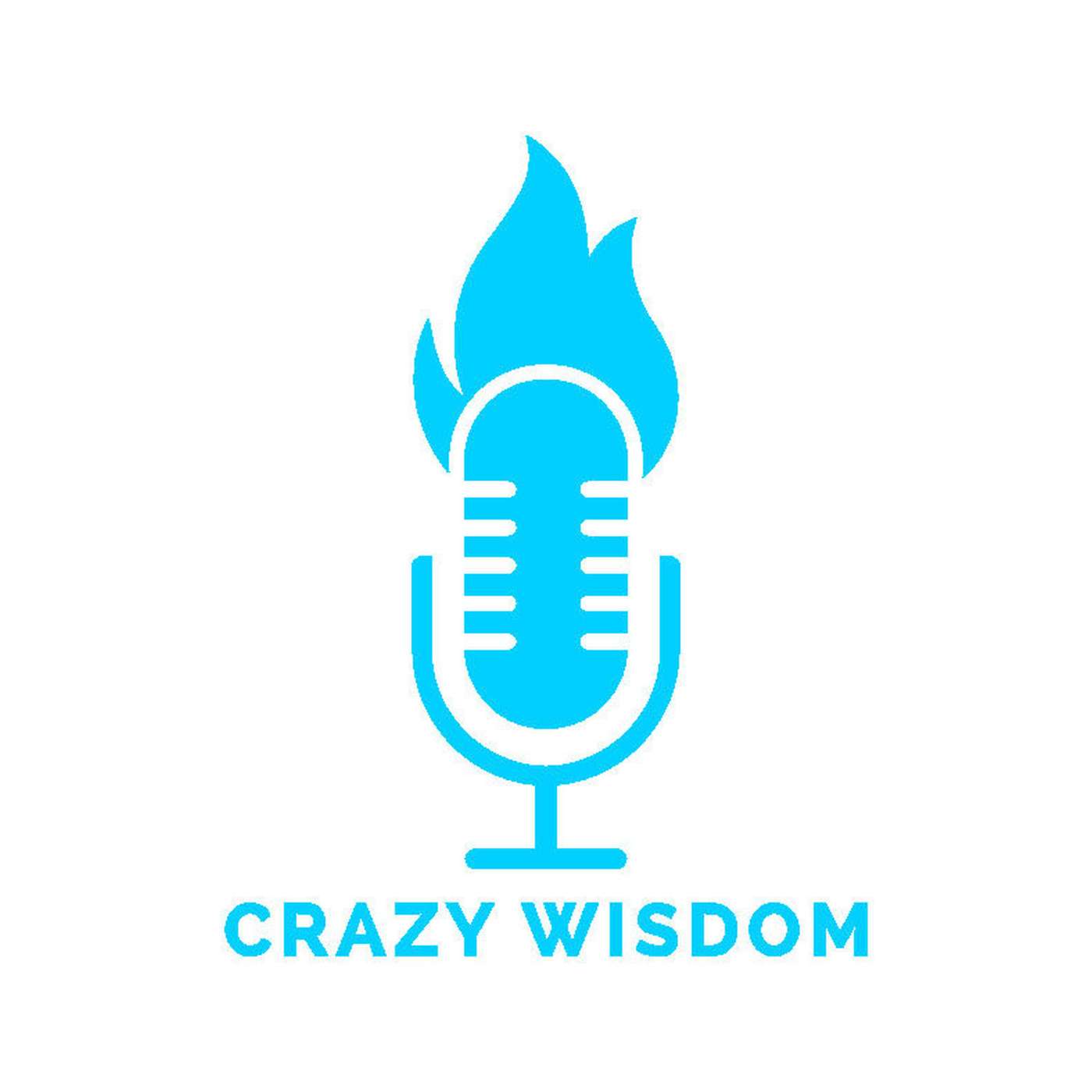

Crazy Wisdom
Stewart Alsop
In his series "Crazy Wisdom," Stewart Alsop explores cutting-edge topics, particularly in the realm of technology, such as Urbit and artificial intelligence. Alsop embarks on a quest for meaning, engaging with others to expand his own understanding of reality and that of his audience. The topics covered in "Crazy Wisdom" are diverse, ranging from emerging technologies to spirituality, philosophy, and general life experiences. Alsop's unique approach aims to make connections between seemingly unrelated subjects, tying together ideas in unconventional ways.
Episodes
Mentioned books

Jul 28, 2025 • 48min
Episode #475: The Illusion We Opt Into: VR, AI, and the Fractals of Reality
Ryan Estes, a Buddhist entrepreneur and host of AIforFounders, discusses the fascinating intersections of AI and ancient philosophy. He explores the evolution of communication and consciousness, stressing how technologies impact our realities. A deep dive into the illusion of VR reveals parallels to Buddhist insights. Ryan also tackles themes of data ownership and the tension between scientism and spirituality. The conversation touches on historical knowledge suppression and the fragility of democracy, prompting thoughts on the future structures of power in a tech-driven world.

Jul 25, 2025 • 58min
Episode #474: Truth Beams and Chaotic Solutions: Building Decentralized Futures
Join Cathal O’Broin, leader of the PoliePals, as he dives into a world where humans, nature, and machines are interconnected through groundbreaking tech. He discusses the fascinating concepts of neural and cryptographic projector-camera systems, known as the 'truth beam,' that redefine data authenticity. The conversation also highlights innovative tinkering, the shifting landscape of decentralized systems, and the vital role of collaboration in creative problem-solving. Get ready for a journey through art, technology, and the future of decentralized communication!

Jul 21, 2025 • 58min
Episode #473: Breaking the Parasite Spell: Metabolic Healing and Remembering Who We Are
Larry Diamond, co-founder of Healing with the Diamonds, shares his inspiring journey from severe metabolic illness to vibrant health. He discusses heart-brain coherence and the alchemical journey of self-discovery. Insightfully, he critiques modern dietary misconceptions and emphasizes the importance of ancestral eating. Larry introduces concepts like insulin resistance and the metaphorical 'parasites' feeding on fear, linking personal wellness to deeper spiritual truths and the wisdom of the divine feminine. His insights encourage a revolution in our approach to health.

Jul 19, 2025 • 57min
Episode #472: FarmBot and the Vision of a Distributed Food Future
Join Rory Aronson, CEO of FarmBot, as he shares his journey in revolutionizing home gardening with open-source technology. He explains how FarmBot operates like a CNC machine for gardens, detailing its evolution from basic electronics to sophisticated custom boards. Rory discusses the importance of closed-loop feedback systems for accuracy and the intricate nature of integrating hardware and software. They envision a solarpunk future, highlighting the role of local food systems and the ease of growing your own food, making sustainability accessible for everyone.

Jul 14, 2025 • 53min
Episode #471: Truth-Seeking Entrepreneurs and the Future of Innovation
Thamir Ali Al-Rahedi, host of the From First Principles podcast, dives deep into the art of questioning and its vital role in entrepreneurship. He discusses how effective questions can drive value while answers merely capture it, challenging the traditional views influenced by scientism. Thamir reflects on Steve Jobs' innovative mindset and spiritual practices as key to Apple’s success. The conversation also touches on the complexities of using AI in education and the generalist's struggle in balancing creativity and discernment.

Jul 7, 2025 • 58min
Episode #470: AI That Learns From Humans: Rethinking Work for the Next Generation
On this episode of Crazy Wisdom, I, Stewart Alsop, talk with Sarah Boisvert, founder of New Collar AI, about the future of work in manufacturing, the rise of “new collar” jobs, and how technologies like 3D printing and AI are transforming skills training. We cover her experience with Fab Labs, creating a closed-loop AI tutor for workforce development, and the challenges of capturing implicit knowledge from retiring experts. Sarah also shares insights from her books The New Collar Workforce and People of the New Collar Workforce, which feature augmented reality to bring stories to life. You can connect with Sarah through LinkedIn.Check out this GPT we trained on the conversationTimestamps00:00 Sarah introduces New Collar jobs and how digital skills are transforming blue collar roles, discussing FedEx robotics and augmented workers.05:00 Stewart asks about 3D printing challenges; Sarah explains advances in printer automation and the ongoing difficulty of CAD design.10:00 They discuss Generation Z as digital natives, instant gratification, and workforce engagement, highlighting Lean manufacturing principles.15:00 Sarah reflects on how technology speeds life up, her experiences with management training, and the importance of communication on factory floors.20:00 They explore text-to-CAD possibilities, Sarah’s closed-loop AI tutor for manufacturing, and the creation of a proprietary technical database.25:00 Sarah describes the scale of open jobs in 3D printing, challenges of filling them, and shifting perceptions of manufacturing work.30:00 Discussion of robotics safety, small business adoption barriers, and the need for human oversight in automation.35:00 Sarah talks about capturing implicit knowledge from retiring experts, using LLMs for factory floor solutions, and military applications.40:00 Knowledge management, boutique data sets, and AI’s role in preserving technical expertise are explored.45:00 Sarah shares insights on product design, her AR-enabled book, and empowering workers through accessible technical training.Key InsightsSarah Boisvert introduces the concept of “new collar” jobs, emphasizing that modern manufacturing roles now require digital skills traditionally associated with white-collar work. She highlights how roles like CNC machinists and 3D printing operators blend hands-on work with advanced tech, making them both in-demand and engaging for a younger, tech-savvy workforce.The conversation explores the rise of Fab Labs worldwide and their role in democratizing access to manufacturing tools. Boisvert shares her experience founding a Fab Lab in Santa Fe, enabling students and adults to gain practical, project-based experience in CAD design, 3D printing, and repair skills critical for today’s manufacturing environment.Boisvert underscores the persistent skills gap in manufacturing, noting that 600,000 U.S. manufacturing jobs remain unfilled. She attributes part of this to outdated perceptions of manufacturing as “dirty and unsafe,” a narrative she’s actively working to change through her books and training programs that show how modern factories are highly technical and collaborative.She reveals her team’s development of a closed-loop large language model for workforce training. Unlike ChatGPT, this system draws from a proprietary database of technical manuals and expert knowledge, offering precise, context-specific answers for students and workers without relying on the open internet.The episode dives into generational differences in the workplace. Boisvert describes how Gen Z workers are motivated by purpose and efficiency, often asking “why” to understand the impact of their work. She sees Lean principles as a key to managing and empowering this generation to innovate and stay engaged.On automation, Boisvert stresses that robots are not replacing humans in manufacturing but filling labor shortages. She notes that while robots improve efficiency, they require humans to program, monitor, and repair them—skills that new collar workers are being trained to master.Finally, she shares her innovative approach to storytelling in her book People of the New Collar Workforce, which uses augmented reality to bring worker stories to life. Readers can scan photos to hear directly from individuals about their experiences transitioning into high-tech manufacturing careers.

Jun 30, 2025 • 54min
Episode #469: Can Tesla Teach a Bot to Bachata?
In this episode of the Crazy Wisdom Podcast, I, Stewart Alsop, sit down with returning guest Brian Ahuja to explore a thought-provoking idea he’s been stewing on—could we one day build a robot capable of true partner dancing? From the biomechanics of salsa to the possibilities of AI embodiment, we unpack what it would take to engineer fluid, responsive movement and how that intersects with everything from artificial muscles to the intimacy of tactile feedback. We also touch on Brian’s long-term vision for a potential lab or foundation to tackle this challenge. You can follow Brian and future developments on Twitter @brianahuja.Check out this GPT we trained on the conversationTimestamps00:00 – Brian Ahuja returns to discuss AI embodiment, sparked by his experience in ballroom dance and curiosity about translating physical intelligence into robotics.05:00 – They explore robotics in partner dancing, touching on the difference between choreographed motion and improvisational, responsive movement.10:00 – Brian breaks down human biomechanics, emphasizing that hip motion in dances like salsa originates from knees and feet—not the hips directly.15:00 – The conversation shifts to balance, proprioception, and ocular reflexes, linking them to movement stability in dance.20:00 – They compare robot vs. human movement, noting robots’ jerky motions and the absence of muscle-based initiation.25:00 – The need for haptic feedback is discussed, with Brian detailing how partner dancing depends on tactile signals and real-time response.30:00 – They touch on robotic form factors, questioning whether humanoid robots are the best approach and pondering the design of artificial muscles.35:00 – Brian proposes the idea of the Ahuja Test, gauging if a robot can move so fluidly it's indistinguishable from a human, using dance as the standard.Key InsightsPartner Dancing as a Frontier for Robotics: Brian Ahuja proposes that partner dancing could be a benchmark for robotic embodiment, where success would indicate a robot’s ability to replicate fluid, responsive human movement. This task is far more complex than solo choreography—it requires real-time tactile feedback, improvisation, and nuanced physical communication.Movement Origin in Humans vs. Robots: A critical difference lies in how movement is generated. Human motion begins with muscle contraction, not at the joints. Robots, however, typically initiate movement at joint points, missing the layered interplay of muscles, tendons, and fascia that create smooth, lifelike motion.Haptic Feedback and Improvisation: Real partner dancing involves subtle cues, like pressure through fingertips, to signal direction and timing. For a robot to follow or lead a dance, it would need a highly sensitive haptic feedback system capable of interpreting and responding to these nonverbal signals in real time.The Limits of Current Robotics: Even with advanced robots like the Tesla bot, current movement still appears jerky and lacks the fluidity needed for partner dancing. The mechanical design—especially the lack of artificial musculature—may impose fundamental limits on how closely robots can mimic human motion.Applications Beyond Dance: The implications of this inquiry stretch beyond dance into fields like physical therapy, elder care, and domestic robotics. A robot that could move like a human could handle tasks requiring adaptability, precision, and physical sensitivity.Vision and Systems Thinking: Brian frames the challenge as a systems problem that might start with a lab or foundation. He emphasizes not needing to do everything alone, recognizing the value of building knowledge iteratively through conversations, research, and community.The Ahuja Test: Inspired by the Turing Test, Brian coins the idea of the “Ahuja Test”—a way to measure if a robot can move indistinguishably from a human. He suggests partner dancing could serve as the ultimate proving ground for such a test, given its demand for embodied intelligence and nuanced coordination.

Jun 23, 2025 • 54min
Episode #468: Forecasting the Market’s Weather: Events, AI, and the Future of Trading
In this episode of Crazy Wisdom, I, Stewart Alsop, speak with Andrew Einhorn, CEO and founder of Level Fields, a platform using AI to help people navigate financial markets through the lens of repeatable, data-driven events. We explore how structured patterns in market news—like CEO departures or earnings surprises—can inform trading strategies, how Level Fields filters noise from financial data, and the emotional nuance of user experience design in fintech. Andrew also shares insights on knowledge graphs, machine learning in finance, and the evolving role of narrative in markets. Stock tips from Level Fields are available on their YouTube channel at Level Fields AI and their website levelfields.ai.Check out this GPT we trained on the conversationTimestamps00:00 – Andrew introduces Level Fields and explains how it identifies event-driven stock movements using AI.05:00 – Discussion of LLMs vs. custom models, and how Level Fields prioritized financial specificity over general AI.10:00 – Stewart asks about ontologies and knowledge graphs; Andrew describes early experiences building rule-based systems.15:00 – They explore the founder’s role in translating problems, UX challenges, and how user expectations shape product design.20:00 – Insight into feedback collection, including a unique refund policy aimed at improving user understanding.25:00 – Andrew breaks down the complexities of user segmentation, churn, and adapting the product for different investor types.30:00 – A look into event types in the market, especially crypto-related announcements and their impact on equities.35:00 – Philosophical turn on narrative vs. fundamentals in finance; how news and groupthink drive large-scale moves.40:00 – Reflection on crypto parallels to dot-com era, and the long-term potential of blockchain infrastructure.45:00 – Deep dive into machine persuasion, LLM training risks, and the influence of opinionated data in financial AI.50:00 – Final thoughts on momentum algos, market manipulation, and the need for transparent, structured data.Key InsightsEvent-Based Investing as Market Forecasting: Andrew Einhorn describes Level Fields as a system for interpreting the market’s weather—detecting recurring events like CEO departures or earnings beats to predict price movements. This approach reframes volatility as something intelligible, giving investors a clearer sense of timing and direction.Building Custom AI for Finance: Rejecting generic large language models, Einhorn’s team developed proprietary AI trained exclusively on financial documents. By narrowing the scope, they increased precision and reduced noise, enabling the platform to focus only on events that truly impact share price behavior.Teaching Through Signals, Not Just Showing: Stewart Alsop notes how Level Fields does more than surface opportunities—it educates. By linking cause and effect in financial movements, the platform helps users build intuition, transforming confusion into understanding through repeated exposure to clear, data-backed patterns.User Expectation vs. Product Vision: Initially, Level Fields emphasized an event-centric UX, but users sought more familiar tools like ticker searches and watchlists. This tension revealed that even innovative technologies must accommodate habitual user flows before inviting them into new ways of thinking.Friction as a Path to Clarity: To elicit meaningful feedback, Level Fields implemented a refund policy that required users to explain what didn’t work. The result wasn’t just better UX insights—it also surfaced emotional blockages around investing and design, sharpening the team’s understanding of what users truly needed.Narrative as a Volatile Market Force: Einhorn points out that groupthink in finance stems from shared academic training, creating reflexive investment patterns tied to economic narratives. These surface-level cycles obscure the deeper, steadier signals that Level Fields seeks to highlight through its data model.AI’s Risk of Amplifying Noise: Alsop and Einhorn explore the darker corners of machine persuasion and LLM-generated content. Since models are trained on public data, including biased and speculative sources, they risk reinforcing distortions. In response, Level Fields emphasizes curated, high-integrity inputs grounded in financial fact.

Jun 16, 2025 • 55min
Episode #467: Slot Machines to Sunlight: Rethinking Computers with Moritz Bierling
In this episode of Crazy Wisdom, host Stewart Alsop speaks with Moritz Bierling, community lead at Daylight Computer, about reimagining our relationship to technology through intentional hardware and software design. The conversation traverses the roots of Daylight Computer—born from a desire to mitigate the mental and physiological toll of blue light and digital distraction—into explorations of AI integration, environmental design, open-source ethos, and alternative models for startup funding. Moritz discusses the vision behind Daylight’s “Outdoor Computing Club,” a movement to reclaim nature as a workspace, and the broader philosophical inquiry into a “third timeline” that balances techno-optimism and primitivism. You can explore more about the project at daylightcomputer.com and connect through their primary social channels on X (Twitter) and Instagram.Check out this GPT we trained on the conversationTimestamps00:00 – Introduction to Daylight Computer, critique of mainstream tech as a distraction machine, and inspiration from Apple’s software limitations.05:00 – Origin story of Daylight, impact of blue light, and how display technology influences wellbeing.10:00 – Exploration of e-ink vs. RLCD, Kindle as a sanctuary, and Anjan’s experiments with the Remarkable tablet.15:00 – Development of Solo OS, the role of spaces in digital environments, and distinctions between hardware and software.20:00 – Vision for AI-assisted computing, voice interaction, and creating a context-aware interface.25:00 – Emphasis on environmental design, using devices outdoors, and the evolutionary mismatch of current computing.30:00 – Reflections on solar punk, right relationship with technology, and rejecting accelerationism.35:00 – Introduction of the third timeline, rhizomatic organizational structure, and critique of VC funding models.40:00 – Discussions on alternative economics, open-source dynamics, and long-term sustainability.45:00 – Outdoor Computing Club, future launches, on-device AI, and the ambition to reclaim embodied computing.Key InsightsTechnology as Both Lifeline and HindranceMoritz Bierling frames modern computing as a paradox: it connects us to society and productivity while simultaneously compromising our well-being through overstimulation and poor design. The Daylight Computer aims to resolve this by introducing hardware that reduces digital fatigue and invites outdoor use.Inspiration from E-Ink and Purposeful ToolsThe initial concept for Daylight Computer was inspired by the calm, focused experience of using a Kindle. Its reflective screen and limited functionality helped Anjan, the founder, realize the power of devices built for singular, meaningful purposes rather than general distraction.Designing for Contextual IntentWith the introduction of Sol OS, Daylight enables users to define digital “spaces” aligned with different modes of being—such as waking, deep work, or relaxation. This modular approach supports intentional interaction and reduces the friction of context-switching common in modern OS designs.Respectful Integration of AIRather than chasing full automation, the Daylight team is exploring AI in a measured way. They’re developing features like screen-aware AI queries through physical buttons, creating a contextual assistant that enhances cognition without overpowering it or promoting dependency.Alternative Economic ModelsRejecting venture capital and the short-term incentives of traditional tech funding, Daylight pursues a community-backed model similar to Costco’s membership. This aligns financial sustainability with shared values, rather than extracting maximum profit.Third Timeline VisionMoritz discusses a conceptual “third timeline”—a balanced future distinct from both primitivism and techno-solutionism. This alternative future integrates technology into life harmoniously, fostering right relationship between humans, nature, and machines.Environmental Computing and Cultural RegenerationDaylight is not just a hardware company but a movement in environmental design. Through initiatives like the Outdoor Computing Club, they aim to restore sunlight as a central influence in human life and work, hinting at a cultural shift toward solar punk aesthetics and embodied digital living.

Jun 9, 2025 • 58min
Episode #466: Emotional Machines and the Shape of Tomorrow
In this episode of Crazy Wisdom, host Stewart Alsop speaks with futurist Richard Yonck about the profound implications of our accelerating relationship with technology. Together, they explore the emergence of emotionally intelligent machines, the nuances of anticipatory systems, and how narrative frameworks help societies prepare for possible futures. Richard unpacks the role of emotion in AI and why cultivating foresight is essential in an age of rapid disruption.Check out this GPT we trained on the conversationTimestamps00:00 – The episode opens with Richard Yonck introducing the concept of artificial emotional intelligence and why it matters for the future of human-machine interaction.05:00 – The discussion moves to anticipatory systems, exploring how technologies can be designed to predict and respond to future conditions.10:00 – Richard explains how narrative foresight helps individuals and societies prepare for possible futures, emphasizing the power of storytelling in shaping collective imagination.15:00 – A deeper look into affective computing, with examples of how machines are learning to detect and simulate emotional states to improve user experience.20:00 – The conversation touches on the role of emotion in intelligence, challenging the misconception that emotion is the opposite of logic.25:00 – Richard outlines how technological disruption can mirror societal values and blind spots, urging more thoughtful design.30:00 – The focus shifts to long-term thinking, highlighting how future-oriented education and leadership are vital in an age of rapid change.35:00 – Closing thoughts center around the evolution of human-technology partnerships, stressing the need for ethical, emotionally aware systems to support a thriving future.Key InsightsEmotion as a Computational Frontier: Richard Yonck highlights that as we push the boundaries of artificial intelligence, the next significant frontier involves enabling machines to understand, interpret, and possibly simulate emotions. This capacity isn’t just a novelty—it plays a crucial role in how machines and humans interact, influencing trust, empathy, and cooperation in increasingly digital environments.The Importance of Anticipatory Systems: One of the core ideas explored is the concept of anticipatory systems—those that can predict and react to future conditions. Richard emphasizes how building such foresight into our technologies, and even into our societal structures, is vital in managing the complexity and volatility of the modern world. It’s not just about responding to the future, but actively shaping it.Narrative as a Tool for Foresight: The discussion underscores that storytelling isn’t just entertainment—it’s a powerful instrument for exploring and communicating possible futures. By framing future scenarios as narratives, we can emotionally and cognitively engage with potential outcomes, fostering a deeper understanding and preparedness across different segments of society.Emotions as Integral to Intelligence: Contrary to the view that emotion impairs rationality, Richard points out that emotions are essential to decision-making and intelligence. They help prioritize actions and signal what matters. Bringing this understanding into AI development could result in systems that more effectively collaborate with humans, particularly in roles requiring empathy and nuanced social judgment.Technology as a Mirror of Humanity: A recurring insight is that the technologies we create ultimately reflect our values, assumptions, and blind spots. Emotionally intelligent machines won’t just serve us—they’ll embody our understanding of ourselves. This raises profound ethical questions about what we choose to model and how these choices shape future interactions.Urgency of Long-Term Thinking: The conversation brings to light how short-termism is a critical vulnerability in current systems—economic, political, and technological. Richard advocates for integrating long-term thinking into how we design and deploy innovations, suggesting that futures literacy should be a core skill in education and leadership.Evolutionary Partnership Between Humans and Machines: Lastly, Richard describes the trajectory of human-technology interaction not as domination or subservience, but as an evolving partnership. This partnership will require emotional nuance, foresight, and ethical maturity if we’re to co-evolve in ways that support human flourishing and planetary stability.Contact InformationRichard Yonck's LinkedIn


